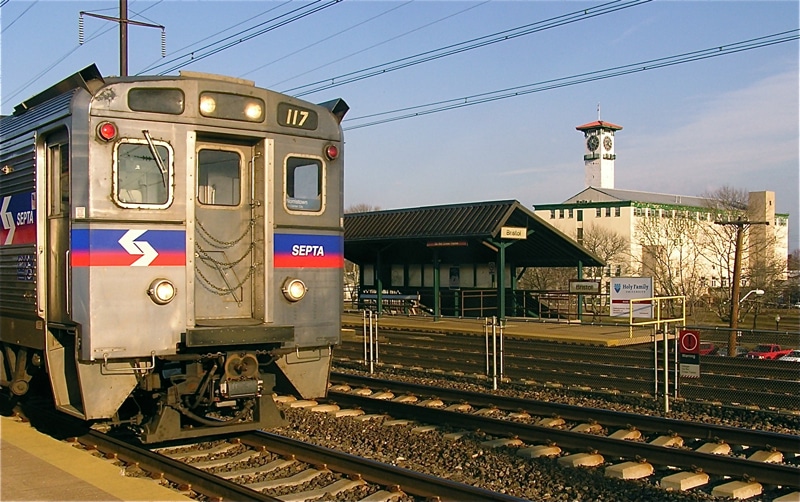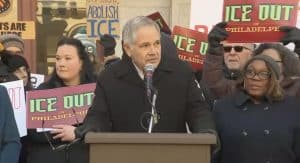Last week, SEPTA released its Fiscal Year 2026 Operating and Capital Budget Proposal, detailing service cuts and fare hikes that advocates and officials have warned could trigger a cascading “death spiral”— debilitating access to transit now and foreclosing on a vision of a vast and modern system in the future if the agency doesn’t receive the necessary funding in the upcoming state budget.
Antonio Deleon, a 38-year-old disabled Levittown resident who lives on a fixed income, has used a SEPTA cross county key card for 19 years to travel around Bucks County and into Philadelphia.
An adult education student at Vita Education Services, Deleon uses SEPTA to commute to Croydon. “Everything that I do relies on SEPTA,” he said. “If this service is cut, I won’t be able to get to class and I won’t be able to get to Center City Philadelphia as much.”
Deleon does community work and volunteers in Philadelphia.
“That’s my only means of commute,” he said. “I sometimes ride Uber and Lyft, but I’m on low income. It puts a strain on my budget that’s already strained.”
Deleon was dismayed a few months ago when SEPTA cancelled its weekend ride for free term. He spends about $150 per month to use SEPTA.
In response to SEPTA’s announcement, state lawmakers rallied on Friday with hundreds of community members in a united call for Pennsylvania’s General Assembly to fund the region’s vital transportation authority. This was organized by members of the Pennsylvania House and Senate Philadelphia Delegations.
“If SEPTA’s goal is to attract new riders, eliminating service is the absolute wrong way to do it,” said State Rep. Jim Prokopiak.
The reduced services and future suspensions of train lines are huge for commuting Bucks County workers and college students, particularly in Trenton, West Trenton, Warminster, and Doylestown.
State Rep. Jim Prokopiak (D-Bucks County) said the Democratic led House of Representatives has already passed legislation three times to properly fund mass transit, and they will be voting on mass transit funding again within the next month.
“The Republican led State Senate has failed to move forward with any of those bills, nor have they voted on one of their own,” said Prokopiak. “The State Senate must take action to fund public transit.”
The proposed service cuts proposed by SEPTA would have profound impacts on the region. “Traffic congestion would increase, increasing commute times and costs for commuters,” said Prokopiak. “Employers would likely suffer workforce shortages as public transit options are eliminated. Per the Greater Philadelphia Chamber of Commerce, over 75,000 jobs could be lost because of these proposed cuts as well as major impacts to tourism and hospitality.”
READ: Keep Public Transit in Bucks County Fully Funded
Prokopiak said all indications are that SEPTA is serious with the proposed elimination of the Trenton line and the other cuts contained in their proposed budget if they don’t receive additional funding to cover their budget deficit.
“If SEPTA’s goal is to attract new riders, eliminating service is the absolute wrong way to do it,” said Prokopiak. “Reducing options for suburban commuters, especially on a route like the Trenton line which is profitable, only hurts SEPTA’s bottom line, especially since only five years ago SEPTA invested nearly $40 million in the Tullytown/Levittown station.”
If SEPTA’s proposed budget cuts go through, those millions would be wasted. Prokopiak said the State Senate must act to properly fund mass transit, and SEPTA must come up with a comprehensive plan to provide efficient and cost-effective mass transit options to the entire Southeast Philadelphia region, including taking into account the growth of the collar counties.
“Supporting transit is part of our commitment to sustainability and environmental responsibility,” said State Rep. Perry Warren.
State Rep. Perry Warren (D-Bucks County) has also expressed his support for continued state funding for public transit.
Without enhanced state funding, SEPTA service cuts would include reducing service on the West Trenton Line, which serves Yardley Station – a station that received a $5 million renovation, completed in 2018. “I was there for the dedication and ribbon cutting,” said Warren, “and there was great community enthusiasm for the improved location and service. It would be a shame for the service to be reduced.”
Further negative impacts of a failure to fund SEPTA also would include a 21.5% average fare increase beginning Sept. 1, service reductions starting in August, and a 9 p.m. curfew on all rail services by January.
Warren also underscored the environmental implications of reducing mass transit.
“When fewer people are on the train, more cars are on the road. That means more traffic congestion, higher emissions, and lower air quality,” he said. “Supporting transit is part of our commitment to sustainability and environmental responsibility.”






